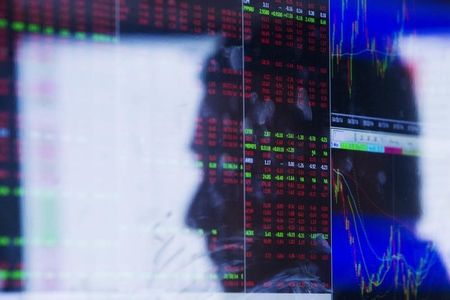Stock Markets
Uranium fuel planned for high-tech US reactors a weapons risk, scientists say

By Timothy Gardner
WASHINGTON (Reuters) – A special uranium fuel planned for use in next-generation U.S. nuclear reactors poses security risks because it can be used without further enrichment for use in nuclear weapons, scientists said in an article published on Thursday.
The fuel, called high-assay low-enriched uranium, or HALEU, is enriched to levels of up to 20%, compared with about 5% for the fuel that powers most existing reactors. Until recently it was made in commercial amounts only in Russia, but the United States wants to produce it to fuel a new wave of reactors.
President Joe Biden’s administration believes nuclear power that is virtually emissions-free is essential in the fight against climate change. Biden’s Inflation Reduction Act provided $700 million for a HALEU availability program including purchasing the fuel to create a supply chain for some planned small modular reactors and other planned high-tech reactors.
is a radioactive element that exists naturally. To make nuclear fuel, raw uranium undergoes processes that result in a material with an increased concentration of the isotope uranium-235.
“This material is directly usable for making nuclear weapons without any further enrichment or reprocessing,” said Scott Kemp, one of five authors of the peer-reviewed article in the journal Science. “In other words, the new reactors pose an unprecedented nuclear-security risk,” said Kemp, a professor at the Massachusetts Institute of Technology and a former science adviser on arms control at the State Department.
A bomb similar in power to the one the U.S. dropped on Hiroshima, Japan in 1945 could be made from 2,200 pounds (1,000 kg) or less of 19.75% enriched HALEU, the article said. “Designing such a weapon would not be without its challenges, but there do not appear to be any convincing reasons why it could not be done,” it said.
The authors said if enrichment is limited to 10% to 12%, the supply chain would be far safer with only modest costs.
The authors said HALEU is a domestic risk as it is not required to have the protections normally required for weapons-usable material. U.S. use of the fuel could also set a precedent for other countries building the reactors where proliferation standards are not as strict.
“Were HALEU to become a standard reactor fuel without appropriate restrictions determined by an interagency security review, other countries would be able to obtain,
produce, and process weapons-usable HALEU with impunity, eliminating the sharp distinction between peaceful and
nonpeaceful nuclear programs,” said the article, also written by Edwin Lyman at the Union of Concerned Scientists nonprofit group.
The U.S. Department of Energy estimates that more than 40 metric tonnes of HALEU could be needed before the end of the decade, with additional amounts required each year, to deploy advanced reactors to support the Biden administration’s goal of 100% clean electricity by 2035.
The DOE did not immediately respond to a request for comment.
TerraPower, a company backed by Bill Gates that has received funding from the Energy Department, hopes to build its Natrium nuclear plant in Wyoming by 2030 to run on HALEU. TerraPower in late 2022 delayed Natrium’s launch date by at least two years to 2030 due to a lack of HALEU.
TerraPower did not immediately respond to a request for comment. The plant is expected to start construction on the non-nuclear side but needs federal permits to build the nuclear work.
Centrus Energy (NYSE:) a U.S. company that has begun making small amounts of HALEU in Ohio and is working with TerraPower to establish commercial production capabilities for the 2030 start, did not immediately respond to a request for comment.
Stock Markets
Suburban Propane director Logan sells $139k in shares
Stock Markets
Stock market today: S&P 500 closes lower, but posts big weekly win
Stock Markets
TD Bank promotes Laura Nitti to retail market president role

 Forex3 years ago
Forex3 years agoForex Today: the dollar is gaining strength amid gloomy sentiment at the start of the Fed’s week

 Forex3 years ago
Forex3 years agoUnbiased review of Pocket Option broker

 Forex3 years ago
Forex3 years agoDollar to pound sterling exchange rate today: Pound plummeted to its lowest since 1985

 Forex3 years ago
Forex3 years agoHow is the Australian dollar doing today?

 Cryptocurrency3 years ago
Cryptocurrency3 years agoWhat happened in the crypto market – current events today

 World3 years ago
World3 years agoWhy are modern video games an art form?

 Commodities3 years ago
Commodities3 years agoCopper continues to fall in price on expectations of lower demand in China

 Economy3 years ago
Economy3 years agoCrude oil tankers double in price due to EU anti-Russian sanctions























